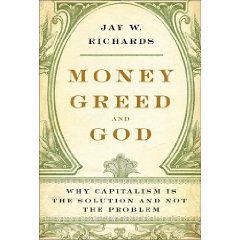Take and Read

December 19, 2009

Justin Taylor comments on a book that is on my must read list for 2010:
"Just noticed that for a limited time Amazon has Jay Richard’s hardcover book, Money, Greed, and God: Why Capitalism Is the Solution and Not the Problem, on sale for 60% off.
"Doug Wilson has written that it’s one of the best books he’s read in some time. Sam Storms says it’s the best book he read in 2009. Kevin DeYoung said it’s the most engaging, readable, and thoughtful Christian defense of capitalism he’s read."
Here’s the table of contents along with list of the myths that Richards sets out to dispel:
"Doug Wilson has written that it’s one of the best books he’s read in some time. Sam Storms says it’s the best book he read in 2009. Kevin DeYoung said it’s the most engaging, readable, and thoughtful Christian defense of capitalism he’s read."
Here’s the table of contents along with list of the myths that Richards sets out to dispel:
1.Can’t We Build a Just Society? Myth no. 1: The Nirvana Myth (contrasting capitalism with an unrealizable ideal rather than with its live alternatives)
2.What Would Jesus Do? Myth no. 2: The Piety Myth (focusing on our good intentions rather than the unintended consequences of our actions)
3.Doesn’t Capitalism Foster Unfair Competition? Myth no. 3: The Zero-sum Game Myth (believing that trade requires a winner and a loser)
4.If I Become Rich, Won’t Someone Else Become Poor? Myth no. 3: The Materialist Myth (believing that intellect cannot create new wealth)
5.Isn’t Capitalism Based on Greed? Myth no. 4: The Greed Myth (believing that the essence of capitalism is greed)
6.Hasn’t Christianity Always Opposed Capitalism? Myth no. 5: The Usury Myth (believing that charging interest on money is always exploitive)
7.Doesn’t Capitalism Always Lead to an Ugly Consumerist Culture? Myth no. 7: The Artsy Myth (confusing aesthetic judgments with economic arguments)
8.Are We Going to Use Up All the Resources? Myth no. 8: The Freeze Frame Myth (believing that things always stay the same—for example, assuming population trends will continue indefinitely or treating “rich” and “poor” as static categories)
9.Conclusion: Working All Things Together for Good
10.Appendix: Is the “Spontaneous Order” of the Market Evidence of a Universe without Purpose?
2.What Would Jesus Do? Myth no. 2: The Piety Myth (focusing on our good intentions rather than the unintended consequences of our actions)
3.Doesn’t Capitalism Foster Unfair Competition? Myth no. 3: The Zero-sum Game Myth (believing that trade requires a winner and a loser)
4.If I Become Rich, Won’t Someone Else Become Poor? Myth no. 3: The Materialist Myth (believing that intellect cannot create new wealth)
5.Isn’t Capitalism Based on Greed? Myth no. 4: The Greed Myth (believing that the essence of capitalism is greed)
6.Hasn’t Christianity Always Opposed Capitalism? Myth no. 5: The Usury Myth (believing that charging interest on money is always exploitive)
7.Doesn’t Capitalism Always Lead to an Ugly Consumerist Culture? Myth no. 7: The Artsy Myth (confusing aesthetic judgments with economic arguments)
8.Are We Going to Use Up All the Resources? Myth no. 8: The Freeze Frame Myth (believing that things always stay the same—for example, assuming population trends will continue indefinitely or treating “rich” and “poor” as static categories)
9.Conclusion: Working All Things Together for Good
10.Appendix: Is the “Spontaneous Order” of the Market Evidence of a Universe without Purpose?




